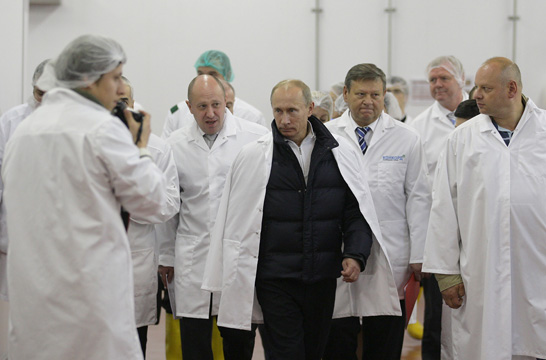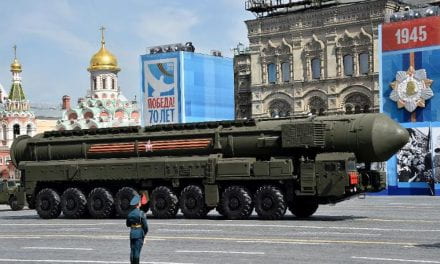By: Finn Hasson*
In mid-February of this year, the Department of Justice announced that the Grand Jury for the District of Columbia would press charges against 13 Russian nationals for exercising “improper foreign influnce on U.S. elections and on the U.S. political system”[1]. The defendants were all employees of the shadowy “Internet Research Agency” (IRA) an organization tied to the Russian government through its leader, real estate and catering mogul Yevgeny V. Prigozhin. Prigozhin has earned the nickname “Putin’s chef” for his food business and for his close relationship with the Russian president [2].
The official Grand Jury indictment published by the DOJ alleges that Prigozhin’s organization has made deliberate efforts to influence American public opinion since as early as 2014 [1]. Prigozhin used funds from his two main business operations—Concord Catering and Concord Management and Consulting—to found the Petersburg-based IRA. The agency’s employees were paid significantly more than the Russian minimum wage to carry out the Russian government’s misinformation campaign. Employees split time between creating fake social media accounts and writing blogs favorable to the Russian government. When a blog was complete, it would be disseminated to the fake accounts; one employee who worked at the agency from 2013-2015 stated in an interview with the New York Times that every employee had a daily quota of 80 comments and 20 shares [2].
In light of this indictment, it is tempting to think of Russian election meddling only as it relates to the US; however, this would underestimate the threat Russia poses to liberal democracy. Prigozhin’s efforts, and others like them, undermine the west’s confidence in the verity of its intelligence reports. If western decision makers are forced to pause to consider the possibility of Russian intervention after receiving every intelligence report, they will lose valuable time in reacting to potentially volatile situations. As organizations like the IRA have become more efficient, experienced, and complex, Russia has sought to expand influence operations in Western Europe. As was the case in the US, these operations have extended beyond conventional hacking and illegal information acquisition.
In one notable case from from 2017, two “independent” Russian radio comedians going by the aliases Vova (Vladimir Kuznetsov) and Lexus (Alexei Stolyarov) called Spanish defense minister María Dolores de Cospedal, posing as members of the Lithuanian defense ministry. The duo claimed that then-leader of the Catalonian independence movement, Carles Puigdemont, was actually a Russian spy charged with destabilizing Spanish democracy. Additionally, they stated that as many as half of all Russian tourists who visited Catalonia since the independence movement’s beginning were Russian secret agents sent to foment public unrest. The comedians then offered the support of the Lithuanian army in Catalonia so that the Spanish province would not “end up like Ukraine” [3].
Understandably, Cospedal found the situation alarming. Later in the day, Cospedal confirmed on Twitter that she suspected something was amiss when the comedians refused to speak English, claiming that the Lithuanian government had “fired the translator.” Cospedal was not aware that the callers were Russian until Kuznetsov and Stolyarov published the conversation online under the title “Puigdemont is an Agent of Putin! (prank)” later in the day [4].
While this example may seem trivial at face value, it belies a serious threat to Western democracy. First, it is important to note that Cospedal did not know the callers were Russian until they released the call publically. It is conceivable, then, that it would have taken longer than a day to ascertain the true identity of the callers had they not made themselves known. Second, the discussion of state security as a prank represents an alarming escalation from the duo’s previous activities. Before calling Cospedal, Kuznetsov and Stolyarov had focused their international efforts on celebrities deemed hostile to the Putin regime. They had never targeted an official of another government, much less gone so far as to invent a false threat to another country’s security [4].
Third, and perhaps most worrisome, is the appearance that Kuznetsov and Stolyarov did not work alone. The most obvious proof of this is their ability to effectively imitate the Lithuanian defense minister well enough to convince his Spanish counterpart to not immediately hang up. Western intelligence agencies have stated that Kuznetsov and Stolyarov, while not technically part of Russian intelligence, have likely received help and information from the Russian government. It is particularly concerning that some of their domestic targets include individuals who were later assassinated in unclear cirumstances. For example, throughout 2012 Kuznetsov and Stolyarov harassed Boris Nemtsov, an outspoken Putin critic and political opposition leader, who was stabbed to death meters from the Kremlin.
In another instance, Kuznetsov and Stolyarov targeted the lawyer of captured Ukrainian pilot Nadezhda Savchenko. During the hostilities with Ukraine, pro-Russian rebels captured Savchenko and smuggled her across the border into Russia, where she was charged for her role in an airstrike that resulted in the deaths of two journalists. The Ukrainian government maintained Savchenko’s innocence. When Savchenko’s lawyer’s attempts to secure her release from Russia began to appear fruitless, he called for a hunger strike. Shortly thereafter, Kuznetsov and Stolyarov called the lawyer posing as representatives of Ukrainian president Petro Poroshenko. They told the lawyer that the president himself had asked him to stop his calls for a hunger strike, as it would stress relations with Moscow [3]. In the case of the call to Cospedal, it seems unlikely that Kuznetsov and Stolyarov would know enough to be able to perform an impression of the Lithuanian defense minister so convincingly that his Spanish counterpart did not immediately know they were frauds. In all three of these examples, Kuznetsov and Stolyarov acted on behalf of the Putin regime. What’s more, the effectiveness with which they did so would suggest that Western suspicion of cooperation between the comedians and Russian intelligence is not unfounded.
The final piece of evidence suggesting cooperation with Russian intelligence is the timeline of the call’s reporting. Kuznetsov and Stolyarov called Cospedal on the morning of 17 November 2017. El Mundo, the world’s largest Spanish-language publication, was the first international news organization to cover the “prank.” Their story, “Embustes del lado de Putin (Tricks on Behalf of Putin),” was published 3 days later on November 20 [3]. At the time of the article’s publication, the two comedians were virtually unheard of outside of Russia. The only material available was in Russian; however, at the exact minute El Mundo published its article (3:03 PM), a Wikipedia page about the duo was suddenly created. Notably, the page is in Catalan, Catalonia’s official regional language and the preffered language of the separatist movement. The Wikipedia page omits any mention of Kuznetsov and Stolyarov’s previous acts against Nemtsov and Savchenko, saying only that they “played a prank” on Spain’s defense minister. There was no Spanish version of the page available. For a Catalonian citizen who heard of the call and wished to learn more, the only available information was heavily redacted [5].
Beyond this is the issue of Puigdemont’s codename, Cipollino. For those who grew up in the territory once constituting the USSR, Cipollino will likely bring back early childhood memories. Originally an Italian cartoon, Cipollino found favor with the communist government for its central theme—the working class taking power from a repressive government [6]. This at first may seem straightforward enough, as Puigdemont claimed his independence movement was in the service of the Catalonian people against a culturally oppressive Spanish government that refused to grant Catalonia the degree of independence Puigdemont and his supporters felt it deserved. However, given that the call was targetting Spaniards, it would make little sense to use a cultural icon of the former Soviet bloc. The reasonable conclusion, then, would be that Kuznetsov, Stolyarov, and whoever supported them did not care if the Spaniards understood the reference. The question then becomes, at whomwas the reference directed?
President Putin’s publicly stated belief is that the dissolution of the Soviet Union was the worst calamity of the 20th century [7]. His policies and actions since then have intimated, if not outright expressed, a desire to reclaim the territory lost with the collapse of the USSR. Russia invaded Georgia in 2008 just before the Beijing Olympic Games, taking advantage of Georgian political unrest to insert its own forces. Russia again flaunted international norms by annexing Crimea and invading eastern Ukraine in 2014. In both cases, Russia used variations of the same argument—there were ethnic Russians in both countries, wrongfully separated from Russia by the collapse of the USSR, who wished to be reintegrated into the Russian state. In both cases, particularly in Ukraine, Russia used regional pro-Russian militias to carry out attacks, divorcing itself from direct involvement; then, when the situation became chaotic, the Russian government asserted its right to protect ethnic Russians, and moved in. Fomenting separatism, then, is central to Russia regaining lost territory. What better way to secretly tell potential separatists that Russia would support them than with a Russian standard about throwing off the yoke of the oppressor like Cipollino?
One must remember in all of this that Kuznetsov and Stolyarov are only two actors in a much wider web. Their involvement over the last few years goes to show what damage even a small team can do; they did not have the infrastructural support of much larger organizations, such as the IRA, showing that Russian intelligence is capable of doing much with little. As is so often the case with Russian intelligence, Kuznetsov and Stolyarov are not the agents of change. They are the agents of disinformation, intended to make Western leaders and citizens question the validity of the information they receive. Then, in moments of crisis—like, say, intervention in a foreign election or the invasion of a former SSR—when decisions need to be made quickly, Westerners will have fundamental doubts about what they do and do not know, and Russia will profit.
References
1) U.S. Department of Justice. 2018. Internet Research Agecy Indictment. https://www.justice.g ov/file/1035477/download
2) MacFarquhar, Neil. 18 February 2018. “Inside the Russian Troll Factory: Zombies and a Breakneck Pace.” New York Times. https://www.nytimes.com/2018/02/18/world/europe /russia-troll-factory.html
3) Colás, Xavier. 20 November 2017. “Embustes del lado de Putin.” El Mundo. http://www.elm undo.es/espana/2017/11/20/5a11e21822601d2a478b45c3.html
4) Europress. 17 November 2017. “María Dolores de Cospedal, víctima de una broma en la que un falso ministro de Defensa letón le asegura que Puigdemont es un espía ruso apodado ‘Cipollino’.” El Mundo. http://www.elmundo.es/cataluna/2017/11/17/5a0f54f9e 5fdeac70b8b46a0.html
5) Wikipedia. 20 November 2017. “Vladímir Kuznetsov (locutor de ràdio).” https://ca.wikipedia.org/wiki/Vlad%C3%ADmir_Kuznetsov_(locutor_de_r%C3%A0dio)
6) Большой театр (Bolshoi Theater of Russia). 28 June 1961. “Чиполлино (Cipollino).” Bolshoi Theater. https://www.bolshoi.ru/en/performances/66/libretto/
7) Associated Press. 25 April 2005. “Putin: Soviet Collapse a ‘Genuine Tragedy.’” NBC News. w ww.nbcnews.com/id/7632057/ns/world_news/t/putin-soviet-collapse-genuine-tragedy/#.WsveLsgh2CQ
*Disclaimer: The content contained in the following material is the sole ownership of the author and does not reflect the views of the Towson University Journal of International Affairs nor Towson University in any respect whatsoever.







